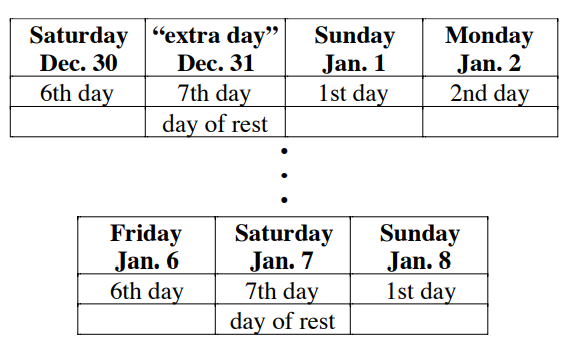francoimps wrote:
It takes 365.25 days for the Earth to make one complete revolution around the sun. Long standing convention makes a year 365 days long, with an extra day added every fourth year, and the year is divided into 52 seven-day weeks. But since 52 times 7 is only 364, anniversaries do not fall on the same day of the week each year. Many scheduling problems could be avoided if the last day of each year and an additional day every fourth year belonged to no week, so that January 1 would be a Sunday every year.
The proposal above, once put into effect, would be most likely to result in continued scheduling conflicts for which one of the following groups?
(A) people who have birthdays or other anniversaries on December 30 or 31
(B) employed people whose strict religious observances require that they refrain from working every seventh day
(C) school systems that require students to attend classes a specific number of days each year
(D) employed people who have three-day breaks from work when holidays are celebrated on Mondays or Fridays
(E) people who have to plan events several years before those events occur
OFFICIAL EXPLANATION
(A) No. The birthdays and anniversaries would continue to fall on the same date (December 30 or December 31) although the occasions on December 31, the “
last day of the year,” would not belong to a week and presumably would not be on a “day” (e.g., Sunday, Monday, etc.).
(B) Yes. Let’s consider the first year the new calendar is implemented. January 1 falls on a Sunday and is a day of rest. The year progresses until Saturday, December 30, with the people in this answer-choice having rested every seventh day, on Sunday. The next day, December 31, would be a day of rest; but because it is the last day of the year, it does not belong to a week and would not be labeled Sunday. Seven days later, the next day of rest falls on Saturday. In the second year the day of rest would always be Saturday. In the third year the day of rest would always fall on a Friday. The following calendar illustrates the situation at the end of the first year:

Since their day of rest falls on different days of the week each year, they are likely to have scheduling conflicts.
(C) No. Nothing in this proposal changes the number days in a year. Students could continue to attend school the same number of days each year, though conceivably one or two of those days (e.g., the current February 29) might not belong to a “
day of the week” (e.g., Monday, Tuesday, etc.).
(D) No. The new calendar would be unlikely to affect these people. Conceivably they might actually have a “four-day” holiday if the last day of the year fell on a weekend during the celebration of a holiday since this day would not count as a Friday, Saturday, Sunday or Monday. However, there is a better answer-choice.
(E) No. The new calendar would have no effect on these people. However, if the event was scheduled on the “
last day of the year,” December 31, or on the extra leap-day, it would not take place on a “day” (e.g., Sunday, Monday, etc.).
Attachment:
 2021-03-13_23-23-48.png [ 43.1 KiB | Viewed 5152 times ]
2021-03-13_23-23-48.png [ 43.1 KiB | Viewed 5152 times ]



 95%
(hard)
95%
(hard)
 60%
(02:28)
wrong
60%
(02:28)
wrong  based on 461
sessions
based on 461
sessions







